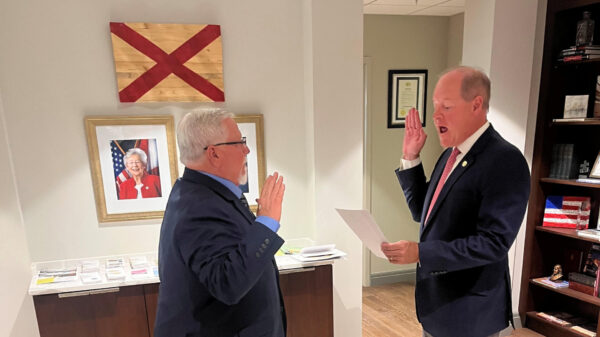A coalition of advocacy organizations is urging Alabama’s Board of Pardons and Paroles to revise its proposed guidelines.
In a joint letter sent in early July, the Southern Poverty Law Center, Alabama Arise, the Alabama Justice Initiative and the American Civil Liberties Union of Alabama responded to the Board’s draft revision of Rule 640-X-2. The proposal comes amid concerns that the board routinely ignores its own scoring criteria.
The proposed changes would retain the current scoring matrix while expanding the severity categories of offenses and adjusting the score thresholds. A new “very high” severity level would apply to certain offenses, such as sex crimes or felonies involving personal injury, and increase the potential severity score to four points.
The score range for a recommended grant of parole would shrink, with only scores of five or below suggesting release. A new “neutral” range would be created for scores between six and eight, while scores of nine or above would still recommend denial. Release would remain at the discretion of the Board.
The letter argues that individuals convicted of low-severity offenses should not be penalized at all in the scoring system, proposing that a severity score of zero points be reserved for such cases.
“The process is meant to assess and determine the individual’s ‘status’ of rehabilitation. That said, ‘Low’ offense severity has been shown to be a statistically significant positive indicator of fitness for release and accordingly should not result in a negative consequence for petitioners,” the letter reads. `
In terms of institutional behavior, the proposal restructures how disciplinary infractions are scored. Still, the coalition urges a more granular approach that distinguishes between being the aggressor and acting in self-defense. The letter recommends a point scale that reflects the severity and context of misconduct, including awarding a -1 score to applicants with zero or one non-violent infraction, to incentivize good behavior.
“Given the undisputedly violent conditions inside Alabama’s correctional facilities, it would be unreasonable and cruel to house individuals in these settings and then punish them for defending themselves by assessing points for the mere act of survival,” the letter states.
The proposed revisions also attempt to streamline how program participation and reentry plans are scored, but the letter suggests modifications to acknowledge programming gaps and the realities of planning for release from prison.
For example, under the current proposal, applicants must complete required programs to score favorably. The coalition recommends a system that recognizes shortfalls due to program unavailability or difficulty finding employment and does not penalize applicants as a result.
“A petitioner is no worse a candidate for release if their employment plan is ‘I will seek employment in food service or landscaping’ than if they already have a job,” the letter reads.
The letter also critiques the way stakeholder input is factored into scoring. Under the proposed rules, any opposition is treated negatively, regardless of whether there is also support. The letter recommends a revised scale to weigh community feedback more fairly: support only should lower an applicant’s score, mixed input should be neutral, and opposition-only cases should increase the score.
In addition to these revisions, the letter proposes adding entirely new scoring factors. These include awarding descending point deductions for petitioners over the age of 60, 70 and 80, for those in poor health and for individuals who have worked in community-based jobs through work release programs.
“Many of these same individuals are then summarily denied when they come up for parole,” the letter reads. “The guidelines form should have a designated section that speaks to, and properly acknowledges, their progress.”
The strongest criticism is reserved for the continued use of advisory rather than presumptive guidelines. The letter argues that without requiring board members to justify deviations from the scoring system, parole decisions will remain inconsistent and “remove the appearance of arbitrariness and capriciousness.”
The advocates also take issue with the proposed “neutral” scoring range, arguing that it creates ambiguity in a system where the only two outcomes are release or denial.
“It is inappropriate for the guidelines to have a neutrality option when the only two results available to petitioners are release or denial,” the letter states.
Finally, the letter calls for written victim impact statements to be incorporated into case files, rather than requiring families to appear repeatedly at parole hearings. This, the letter suggests, would strike a more humane balance between victims’ rights and the parole process.
“These new guidelines have importance far beyond political expedience,” the letter concludes, “as these new rules must adequately safeguard the liberty interests of the thousands of people who will operate under the Bureau’s policies and procedures and ensure that the decisions made in the name of public safety are driven by sound and proven metrics.”




















































